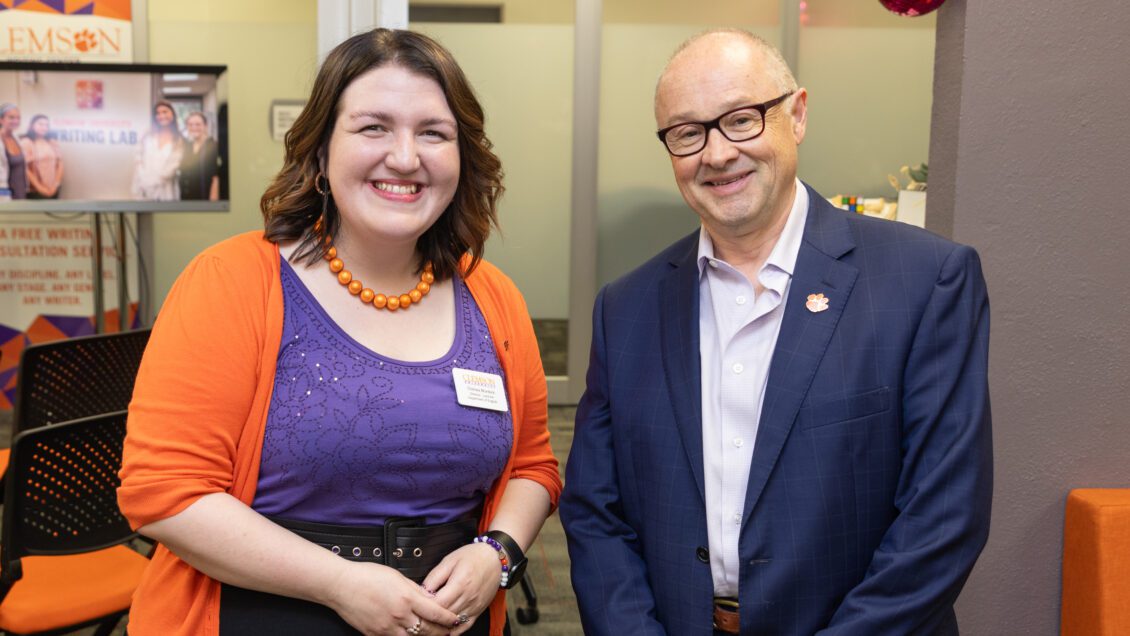Dear Faculty, Staff, Alumni and Friends,
As I promised in my first column for the new College of Arts and Humanities, several of my columns this year will set out our goals and aspirations.
Four “pillars” have emerged early on in discussions about our College’s strengths — strengths that span our departments and that contribute to the educational value of Clemson as a whole. These four pillars are writing, pre-law, ethics and what I am calling student fulfillment. For this column, I will explore the importance of the first.
Our culture lacks appreciation for the art of writing and the patience for the lifetime of practice required to master it. Nevertheless, we live in an “information age” in which successful communication is more than ever reliant on the written word. No matter what we do in life, or what our career or profession ends up being, writing coherently and persuasively is essential.
Our new college is saturated with writing, and every degree program we offer requires writing excellence, but we also support writing education in a number of key ways for the entire university.
There is, of course, the English department’s range of general education requirements, especially its 1030 – Composition and Rhetoric – class which is a staple of the first-year student experience. However, our support of writing is not limited to coursework.
The Pearce Center was established when Roy and Marnie Pearce of Columbia gave a $1.5 million gift to Clemson to establish the Roy and Marnie Pearce Center for Professional Communication. It became the home of the “Writing Across the Curriculum” (WAC) initiative brought to Clemson by Art Young in 1987 when he was named to the Robert S. Campbell Chair of Technical Communications, established by a $1 million gift from Bob and Betsy Campbell in 1986, the first endowed chair of its kind in the nation.
TIME Magazine recognized the effort and the accomplishment when it declared Clemson University among four colleges and universities named “College of the Year” in 2001 for being “on the cutting edge of the communication-across-the-curriculum (CAC) movement, in which faculty integrate not only writing, but also oral, visual, and electronic communication in all disciplines.”
The Pearce Center hosted this year’s International Writing Across the Curriculum conference in Greenville, so Clemson continues to be a major player internationally in this area.
We also support the Writing Lab, which celebrates its 40th anniversary this year. The Writing Lab is staffed by Clemson graduate students and offers help with writing to any student at the university seeking assistance. Last year alone, the lab held 1,441 student appointments and supported 892 students. For a much deeper dive about the Writing Lab, I would refer you to their outstanding annual report. I wish more students would make use of this excellent service, because we all need help with our writing!
Last, but not least, the new Department of Interdisciplinary Studies is developing a series of courses under the umbrella of Professional Communication and Information Design (PCID) to help students in engineering, business, and the sciences with writing skills that are particular to their fields. Among those faculty participating in this initiative is David Blakesley, the current holder of the Robert S. Campbell Chair of Technical Communications.
The roots of Clemson’s commitment to and involvement with writing run wide and deep, and the unbroken tradition stretches back a half-century. With the increased focus of our new College, we are positioned to ensure that every Clemson student is equipped with the writing skills to transform our state, our nation and the world.
Go Tigers!
Nicholas Vazsonyi, Dean
College of Arts and Humanities
Follow Dean Vazsonyi on Instagram.
Get in touch and we will connect you with the author or another expert.
Or email us at news@clemson.edu

